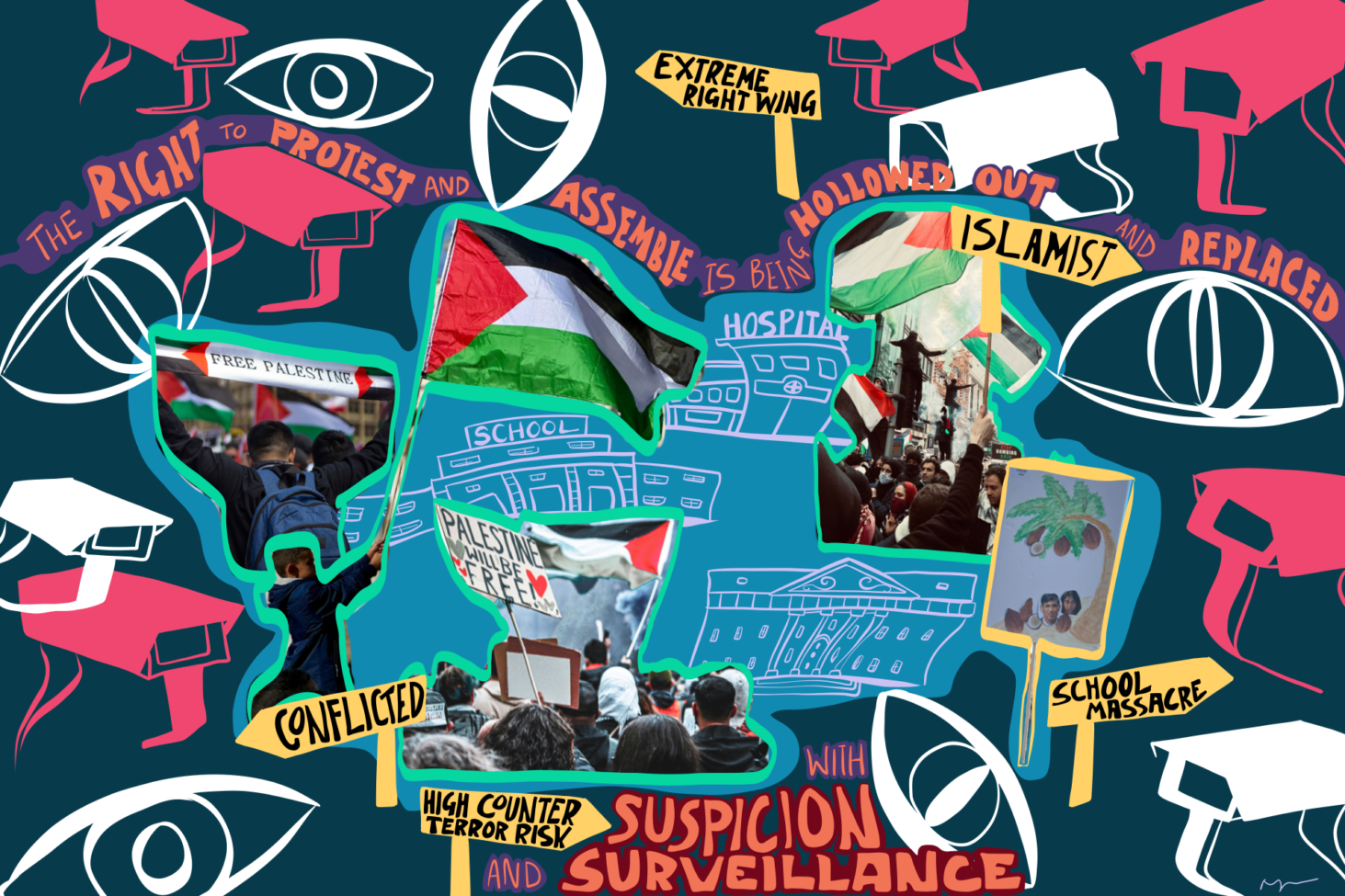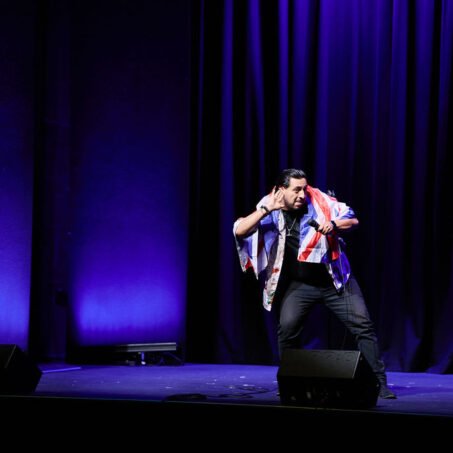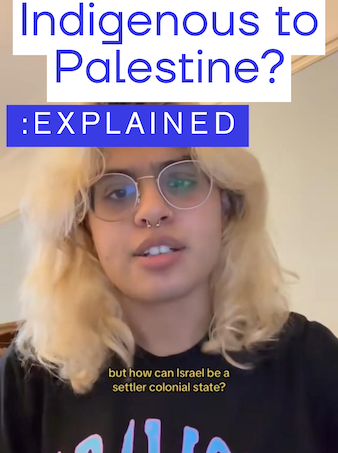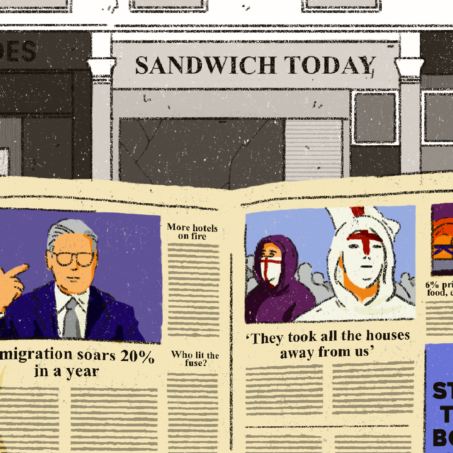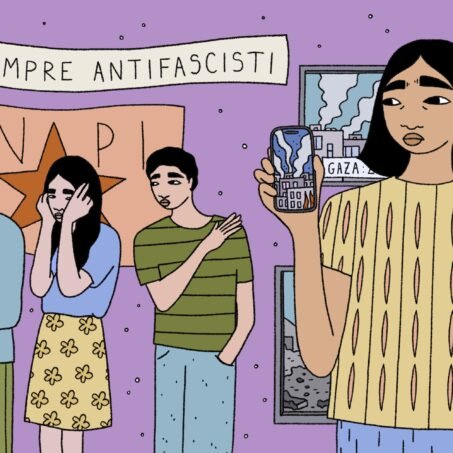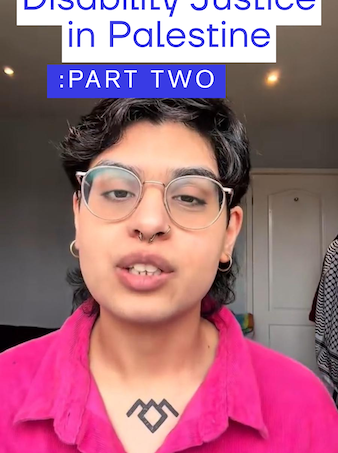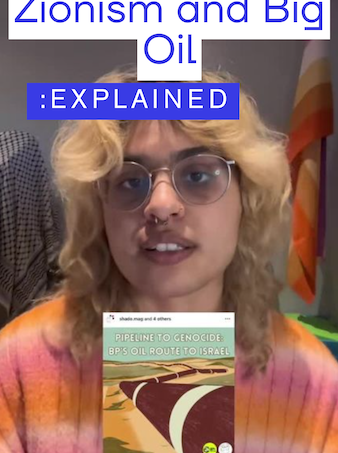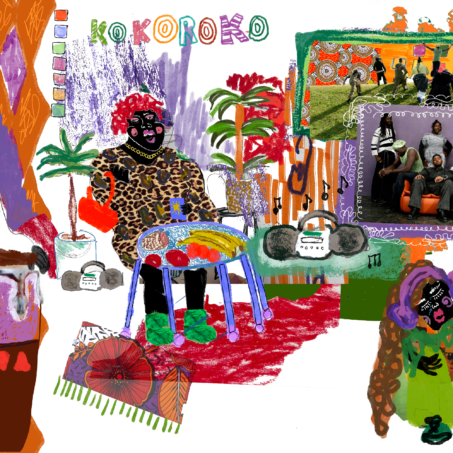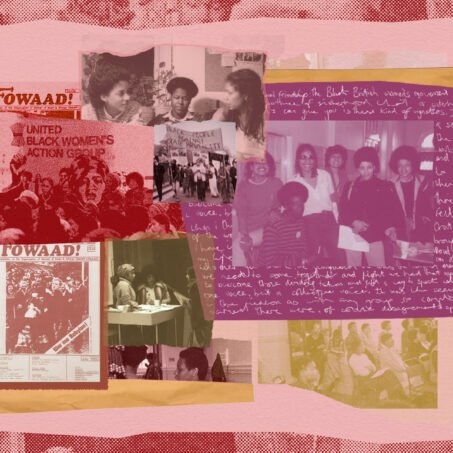It’s no exaggeration to say that protesting for Palestine is becoming more dangerous across the UK. Since the government proscribed Palestine Action as a terrorist organisation on July 5th of this year, more than 700 people have been arrested, with 70 charged under counter-terrorism laws. Others are still awaiting charges. What we’re witnessing is the expansion of a culture of surveillance and criminalisation around those opposing a genocide – one that has already produced famine by design.
Even music artists are targeted. In a now-infamous iteration of Glastonbury festival, Kneecap were censored by the BBC, while Bob Vylan was broadcast chanting against the IDF – and is now under police investigation. The message is clear: oppose genocide, and you will be treated as a threat.
At Insaafi, we work at the intersection of campaigning, social justice, heritage, and creative arts. Over the past year we’ve been researching pro-Palestinian activism after hearing reports that even children arrested at demonstrations have been referred to Prevent.
What is Prevent?
Prevent is one branch of the government’s Counter-Terrorism Strategy, introduced by the Labour government during the 2000s. Officially, it claims to intervene before people become “radicalised.” In practice, it has long been a tool of surveillance and control.
Since its inception, Prevent has been criticised for discrimination against racialised folks, disproportionate targeting of Muslim communities, and, according to Amnesty International, a “chilling effect on the rights to freedom of expression, freedom of association, and peaceful assembly.”
The examples are often absurd: in 2016, a four-year-old was referred to Prevent after mispronouncing “cucumber” as “cooker bomb.” But beneath the absurdity lies a serious reality: Prevent is now deeply embedded across schools, universities, hospitals, and councils – with almost no transparency about how it operates.
Clamping down on Palestinian advocacy
We know that the government has been disproportionately clamping down on pro-Palestinian rallies since they have became a commonplace weekend activity. A prominent example is the case of Marieha Hussain, a British Pakistani teacher who went viral last year for holding up a placard depicting Rishi Sunak and Suella Braverman as coconuts at a pro-Palestinian march, to then be charged with a racially aggravated public order (for which she has since been acquitted).
And now, we know that there’s been a huge rise of people signposted to Prevent after the beginning of the genocide in Gaza, and a definite link between the targeting of pro-Palestine activists and Prevent. There are five categories for being referred to Prevent: extreme right wing, Islamist, conflicted, high counter-terror risk (but no ideology present), and school massacre. It isn’t clear under what category pro-Palestinian campaigners are signposted to Prevent – nor is it clear how resisting a genocide is perceived as being radicalised towards terrorism – but there’s information that proves a jump in Prevent referrals, and especially through the education sector.
Since Israel’s latest assault on Gaza, Prevent referrals have surged – especially from schools. Campaigners resisting genocide are being funnelled into a system that is supposedly about tackling terrorism, despite there being no clear category under which Palestine solidarity could even fit.
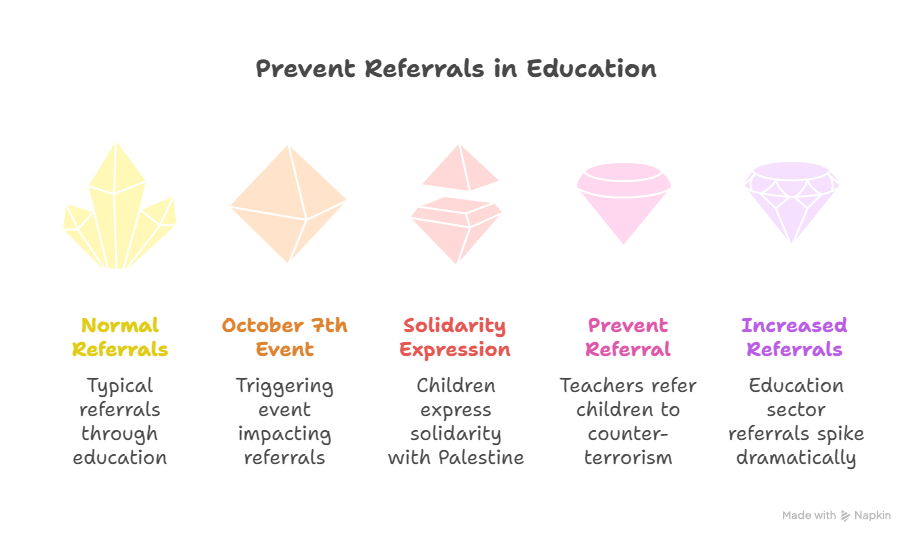
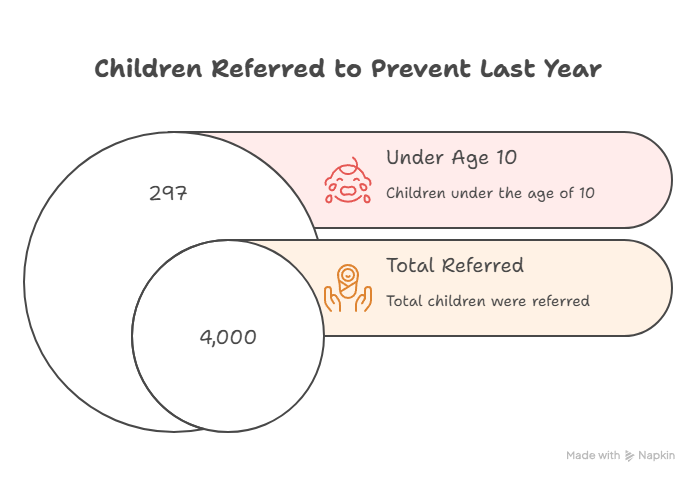
Criminalising protest, criminalising children
A Palestinian child wore a Palestine flag patch to Barclay Primary School in east London, and he was reprimanded by a teacher. The school then asked families to stop sending children into school with any “political signs,” threatening additional referrals to Prevent.
Nearly 4,000 children were referred to Prevent last year, with 297 under the age of 10. Since October 7th, referrals through education have spiked dramatically, now accounting for 40% of all cases.
We have anecdotal evidence from organisations like Cage and Prevent Watch. Even the head of the Met’s Counter-Terrorism Command, Dominic Murphy, admitted there had been a “substantial jump” in referrals linked to Palestine. And yet, the Home Office refuses to publish detailed data. What we do know is enough: children are being referred to counter-terrorism by their teachers for expressing solidarity with Palestine.
Targeting youth
The repression doesn’t stop at referrals. As well as Prevent, we at Insaafi have witnessed safeguarding powers like the Children Act being used against parents and guardians whose children have attended pro-Palestinian demonstrations.
The use of the Children Act and Prevent slowly builds up to a picture around solidarity with Palestine. If you’re a parent, social services could call you, and if you’re a child, you could be signposted for deradicalisation – what they call “channel intervention.” All of it builds a pattern of behaviour from local authorities and police forces towards predominantly racialised people, overwhelmingly Muslim, who are being told that their freedom of speech and freedom of assembly constitutes, in some way, a form of extremism.
Article 11 of the Human Rights Act guarantees the right to protest and assemble. In reality, those rights are being hollowed out, replaced with suspicion and surveillance.
Universities and colleges are also complicit: students and staff have been referred to Prevent, while police have carried out “welfare checks” – better understood as intimidation visits – at campus encampments for Palestine.
Students push back
But we know that university students won’t stand by and let Prevent intimidate them. When the Counter-Terrorism and Security Act was implemented in 2015, it placed a responsibility on local authorities – including universities, hospitals, and councils – to identify individuals through the Prevent scheme. It created a Statutory Prevent Duty for publicly funded organisations to become complicit in the Prevent apparatus. So, in 2017, the National Union of Students Black Student Campaign launched a campaign called “Preventing Prevent.”
The campaign was extremely successful, with over 50 different student unions adopting anti-Prevent policy across the country.
That resistance has returned in the face of genocide. Nearly 200 sabbatical officers and student groups across 52 campuses recently threatened to disaffiliate from the NUS over its failure to defend students disciplined for Palestine solidarity.

Join our mailing list
Sign up for shado's picks of the week! Dropping in your inbox every Friday, we share news from inside shado + out, plus job listings, event recommendations and actions ✊
Sign up for shado's picks of the week! Dropping in your inbox every Friday, we share news from inside shado + out, plus job listings, event recommendations and actions ✊
One prominent example of this repression has been at SOAS, where Sabbatical Officers Abel Harvie Clarke and Alexander Cachinero Gorman have announced they will be taking SOAS to an employment tribunal after they were disbarred from their respective roles as Democracy and Education Officer and Welfare and Campaigns Officer because of their pro-Palestine solidarity. Students have not forgotten the warnings of a decade ago: Prevent, a huge social engineering project, was always going to be used to crush dissent.
The Shawcross Review
Although we know Prevent has been used disproportionately against Muslim and racialised communities, the government’s so-called “independent” review argued that Prevent isn’t doing enough to tackle Muslim extremism. That review was led by William Shawcross – a man with a long record of anti-Muslim comments. Unsurprisingly, his report claims Prevent has “a double standard when dealing with the extreme right wing and Islamism.” In other words, he believes the programme now focuses too much on the far right.
But what Shawcross describes as “mildly controversial or provocative forms of mainstream, right-wing leaning commentary” are anything but mild. They are the breeding ground for fascism: a petri dish for the riots we’ve seen outside hotels housing people seeking asylum; the growth of white-only settlements; and the surge in far-right organising across the UK. In Wales alone, half of all Prevent referrals are now for right-wing extremism – the highest rate in the country. Groups like The Woodlander Initiative, building an all-white enclave in mid-Wales, or Voice for Wales, repeatedly protesting outside a hotel for asylum seekers, are not marginal. They represent the very real danger of far-right violence.
Yet Shawcross wants us to believe the real problem is that Prevent isn’t targeting Muslims enough. This is a dangerous inversion of reality. The uncomfortable truth he refuses to face is that white supremacy, not Islam, is fuelling the most visible threats in our communities. By downplaying these dangers and reframing them as “overreach,” Shawcross is sympathising with the far right.
This follows a long pattern: from Enoch Powell’s “Rivers of Blood” to Keir Starmer’s warning of an “island of strangers,” mainstream politicians have often normalised far-right talking points. As A. Sivanandan put it, “What Enoch Powell says today, the Conservatives will say tomorrow, and the Labour party legislates on the day after tomorrow.” Shawcross’s review fits squarely into that trajectory, seeking to legitimise Islamophobia while casting suspicion on Muslims, refugees, and now, those protesting the genocide in Palestine.
The review, writes lyas Nagdee (who is now Amnesty’s Racial Justice Director, but back in 2017 was a lead editor of the Preventing Prevent campaign) is “riddled with biased thinking, errors, and plain anti-Muslim prejudice.” And he’s right. Shawcross’s review isn’t just biased – it’s wrong, and the data proves it.
The Home Office publishes Prevent data in deliberately confusing ways, but here’s what we know: of nearly 7,000 people referred in 2023–24, only 7% received channel intervention training. And the highest proportion of those cases were for far-right extremism. The threat is clear, even if Shawcross refuses to see it. Meanwhile, Prevent is still disproportionately weaponised against young people, Muslims, and those standing in solidarity with Palestine.
The Shawcross review attempts to drag Prevent back to what it was always designed to be: a tool for spying on and disciplining Muslim and racialised communities, while excusing the rise of the far right.
Enduring solidarity
In 2003, a group of activists broke into RAF Fairford and sabotaged US planes that would be used to bomb Iraq. Now-Prime Minister Keir Starmer, who was then working as a human rights barrister, took up the case. He successfully argued that while the actions were unlawful, the actions were in fact justified as an attempt to prevent war crimes. The activists were acquitted.
Two decades later, under his leadership of Labour, Palestine Action has been proscribed as a terrorist organisation for taking similar action – spray-painting an RAF aircraft used in arming Israel. Today, simply holding a sign reading “I support Palestine Action” can get you arrested.
Welsh counter terrorism police detained 80-year old Marianne Sorrell for 27 hours after holding such a sign. In the Guardian, Marianne said: “At 80, to be treated like a dangerous terrorist is deeply shocking.” Defend our Juries have organised dozens of protests across the United Kingdom since the proscription of Palestine Action, and hundreds have been arrested in recent months, often for nothing more than public expressions of solidarity.
This is the same logic as Prevent: surveillance expands, accountability shrinks, and protestors are criminalised while the state continues to fuel genocide. But what is being proven is that the people are not going to go down without a fight.
The United Kingdom is deeply, deeply implicated in the genocide – yet it’s those who oppose genocide who are branded terrorists. The use of Prevent and anti-terrorism powers against campaigners is a way to quash dissent while arms factories up and down the country continue to export to Israel. The revolt is mounting against Prevent and the intelligence gathering of the state. As Kneecap said: “The story is the genocide, not us.”
What can you do?
Podcasts and videos:
- The Palestine and Analysis and Discussion Playlist by Millennials Are Killing Capitalism
- The Electronic Intifada runs weekly live-streams offering breaking news and analysis. The weekly stream includes the Resistance Report, featuring Jon Elmer’s reportage and analysis of the battlefield in the Gaza strip between the Israeli army and the armed Palestinian resistance.
- Declassified UK have different playlists available about Palestine, including the UK’s role in the conflict.
- The Malcolm Effect’s #124 Campus Repression: SOAS podcast episode hosted by campaigner Momodou Taal. This episode features Haya Adam, Tara Mann, Abel Harvie-Clarke and Alex-Cachinero-Gorman from the SOAS Encampment for Gaza.
Organisations:
- Network for Police Monitoring
- Maslaha
- Amnesty International
- Liberty
- Prevent Watch
- Defend Our Juries
- Islamic Human Rights Commission
- West Wales Against Arms
- The Sameer Project
Resources:


